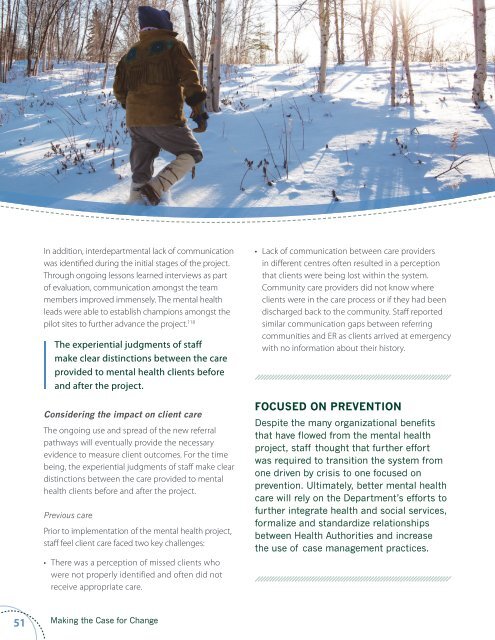Full Report
Full Report
Full Report
You also want an ePaper? Increase the reach of your titles
YUMPU automatically turns print PDFs into web optimized ePapers that Google loves.
In addition, interdepartmental lack of communication<br />
was identified during the initial stages of the project.<br />
Through ongoing lessons learned interviews as part<br />
of evaluation, communication amongst the team<br />
members improved immensely. The mental health<br />
leads were able to establish champions amongst the<br />
pilot sites to further advance the project. 118<br />
The experiential judgments of staff<br />
make clear distinctions between the care<br />
provided to mental health clients before<br />
and after the project.<br />
Considering the impact on client care<br />
The ongoing use and spread of the new referral<br />
pathways will eventually provide the necessary<br />
evidence to measure client outcomes. For the time<br />
being, the experiential judgments of staff make clear<br />
distinctions between the care provided to mental<br />
health clients before and after the project.<br />
Previous care<br />
Prior to implementation of the mental health project,<br />
staff feel client care faced two key challenges:<br />
• There was a perception of missed clients who<br />
were not properly identified and often did not<br />
receive appropriate care.<br />
• Lack of communication between care providers<br />
in different centres often resulted in a perception<br />
that clients were being lost within the system.<br />
Community care providers did not know where<br />
clients were in the care process or if they had been<br />
discharged back to the community. Staff reported<br />
similar communication gaps between referring<br />
communities and ER as clients arrived at emergency<br />
with no information about their history.<br />
Focused on prevention<br />
Despite the many organizational benefits<br />
that have flowed from the mental health<br />
project, staff thought that further effort<br />
was required to transition the system from<br />
one driven by crisis to one focused on<br />
prevention. Ultimately, better mental health<br />
care will rely on the Department’s efforts to<br />
further integrate health and social services,<br />
formalize and standardize relationships<br />
between Health Authorities and increase<br />
the use of case management practices.<br />
51<br />
Making the Case for Change














